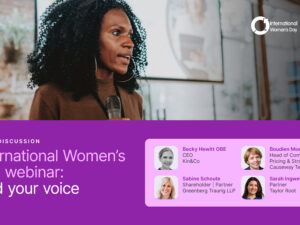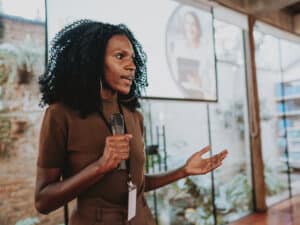My #ComingOutStory – Rebecca Crisp
This piece is the first part of our #ComingOutSeries, where we will be sharing insights from employees within the business to celebrate National Coming Out Day. Our #ComingOutSeries is centred around bringing your whole self to work. We hope that this content empowers people and promotes intersectionality for us all to support Coming Out.
Being unapologetically myself
Coming out is important as the world is inherently based on the nuclear family model, tailored to heterosexuality. The aim should be to reach a point where ‘coming out’ is no longer necessary; to ‘come out’ is to go against the typical norms of society whereas the goal is normalisation. If I had children, I would tell them from a young age you love who you love, coming out would not be necessary – simply be who you are. Though whilst we live in a world centred around heterosexuality it’s an important rite of passage for anyone in the LGBTQ+ community; being unapologetically yourself is liberating. Coming out has allowed me to take pride in who I am and gave me a new lease of confidence.
I grew up in a small town in the North where people in my community were predominately straight. My home friends born within this rural community struggled more to understand than my university peers. I felt confident to come out at university, in a new environment, surrounded by diversity and intersectionality. I found others like me through LGBTQ+ communities and organised club nights. There was always room for inclusion and to be proud of who you are.
‘Being unapologetically yourself is liberating, I gained a new lease of confidence.’
It comes in stages
When I hadn’t come out, I would still feel happy for those who had. Coming out means different things to different people and it doesn’t matter what stage of life you become ready. I didn’t feel forced to come out; it was refreshing to know at the stage that I chose to do so it would be accepted. I was very fortunate to be in such a situation.
There were two different stages for me: coming out to my friends and then family. Coming out to my friends was easier; I held back more with my family. Friends provided me with a safety blanket. The younger generation, I find, are more open and inclusive. Older people from different generations tend to have different morals and values, gained from an era where there were very different views on the LGBTQ+ community. Attitudes are more deeply ingrained and less susceptible to change and these learned attitudes and implicit biases make these conversations inherently more difficult.
Coming out isn’t linear. I was a bit apprehensive as you know it will change the trajectory of your life. I was lucky my mum was very supportive of me; she gave me the confidence to be myself. Negativity from her would have deeply affected me and my perception of myself.
‘It was refreshing to know at the stage that I chose to come out, it would be accepted.’
A marathon, not a sprint
I spent a long time struggling with my identity and being able to accept who I am; since reaching that point, I now feel very confident and liberated. Perhaps the hardest part of coming out is accepting yourself and reaching that point is rather euphoric.
Inclusivity in the workplace is essential. The SR Group aims to play a vital role in making the workplace more progressive whether it be with mental health, agile working or DEI. I don’t think there is outward homophobia in the workplace, yet a lot of LGBTQ+ experiences can’t be understood by people to whom it does not apply. At times you can receive comments and use of language that doesn’t come from a place of hate but a place of misunderstanding and lack of exposure to said issues. Having a DEI committee can help educate on LGBTQ+ issues in the workplace and steer people towards better use of inclusive language.
I guess the issue with this is that you’re at work to work. When collaborating with people at work you are mostly having work-related or surface-level conversations and perhaps don’t wish to share that you are part of the LGBTQ+ community; the question is probably never brought into the conversation.
With work colleagues from varying eras, you perhaps share less lived experiences than with your age-group peers. We could perhaps enable others to feel less pressure and feel safe by having a core central LGBTQ+ and allies’ group at work, opening it up to people who want to celebrate LGBTQ+ identities (perhaps making it more accessible to those that have not yet come out).
‘Perhaps the hardest part of coming out is accepting yourself and reaching that point is rather euphoric.’
A piece of advice
Be proud of who you are and take your time. The right time is when you decide. There is no pressure – it doesn’t make you less part of a community. Each journey is personal and particular. No one coming out experience is the same. Parents need to have an open mind when it comes to LGBTQ+ issues as the impression parents give is what sticks with you. Having parental/guardian backing allows you to go forward knowing you have the support of those that you hold most dear so please – listen and be kind.
Another piece of advice would be not to assume someone’s sexuality and to remain open-minded. Members of the LGBTQ+ don’t look a certain way. I think some people can’t understand what they can’t see and assumptions of identity can be harmful and alienating. If you don’t conform to a ‘gay’ stereotype, people can be dismissive – I have frequently had my sexual identity challenged because of the way I present. Gay doesn’t have a look; stereotypes are harmful and should be avoided. If someone is comfortable enough to share their sexuality with you, be conscious of language and try not to say something invasive, borderline offensive, or triggering.
‘Gay doesn’t have a look; stereotypes are harmful and should be avoided.’
Thank you to Rebecca Crisp for her insights.


